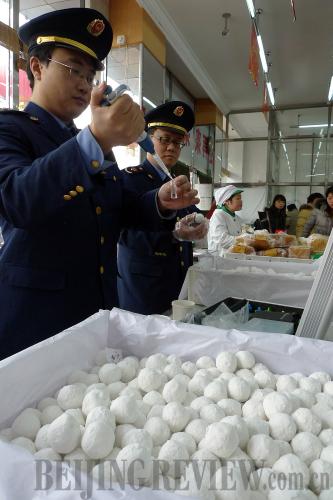|
 |
|
SAFETY INSPECTION: Regulators check the content of flour bleaching agents in glutinous rice dumplings in a food factory in Beijing on February 23, 2010 (ZHANG XU) |
Back to natural
In 2008, melamine-tainted baby formula milk powder was reported to sicken nearly 300,000 children around China and killed six. The scandal triggered deep public concerns over chemicals added to food. In December 2008, online posts said flour bleaching agents were even more detrimental to health than melamine.
"The threat to food safety in China is not that the additives themselves are not safe," said Su Zhi, Director of the Food Safety Coordination and Supervision Bureau of the Ministry of Health. "The real problem lies in the use of unauthorized chemicals in food and overuse or other incorrect use of food additives."
In April 2010, reporters with Beijing-based Legal Evening News found a flour bleaching agents producer in Rugao City, Jiangsu Province, blended lime powder into its products. Lab tests by regulators showed the company's flour bleaching agents contained as much as 30 percent lime powder.
The contaminated flour bleaching agents were sold through wholesalers to large and medium-sized flour processing companies in Shandong, Jiangxi and Anhui provinces.
Worrying about food safety, the public favors natural food. The Food Safety Law implemented in 2009 also stipulates food additives must be evaluated for their necessity and safety before their use is authorized.
Feng Ping, together with other nine members of the CPPCC National Committee, first submitted a proposal on the checking of flour bleaching agents at the First Session of the 11th CPPCC National Committee in March 2008. The proposal said consumers should be given the right to choose whether flour bleaching agents should be added.
In October 2008, Feng wrote a long letter to the CPPCC National Committee, saying benzoyl peroxide should be banned in food and suggested the CPPCC National Committee should conduct relevant research and the government should make a quick decision.
His letter was transferred to top government leaders and received their attention, who ordered relevant government agencies to address the issue.
In March 2010, Feng and another 16 CPPCC National Committee members put forward another proposal to ban benzoyl peroxide and calcium peroxide.
The Ministry of Health again solicited public feedback on whether to continue using flour bleaching agents last December.
Consumers almost unanimously agreed to ban the additives, the ministry said.
On March 1, the Ministry of Health and six other ministries announced the ban on benzoyl peroxide and calcium peroxide.
"The debate over the safety of flour bleaching agents has been going on for about a decade in China, and will continue for decades, but as they are no longer necessary, they should be banned," Feng recently told China National Radio.
Unnecessary chemicals added to food might pose food safety hazards and hurt consumers, he said.
The claim flour bleaching agents could increase the extraction rate of flour by 5 percent does not hold water, as bleaching agents are added after wheat is milled into flour, he said.
Many consumers feel relieved about the ban. Jiang Chunlin, a resident in Yantai City, Shandong Province, said he welcomed the ban while he was selecting flour in a supermarket.
"I do not think whiter steamed buns are better. Regardless whether flour bleaching agents are harmful, natural food is better," Jiang said. | 